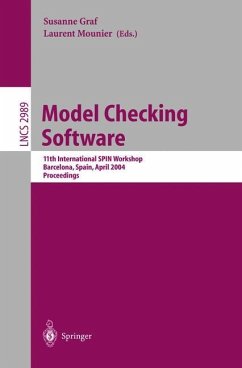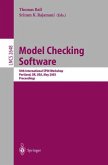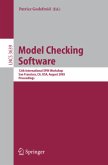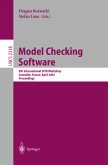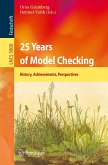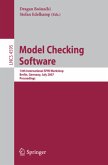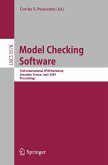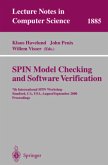This book constitutes the refereed proceedings of the 11th International SPIN workshop on Model Checking Software, SPIN 2004, held in Barcelona, Spain, in April 2004.
The 19 revised full papers presented together with the abstracts of an invited talk and 2 tutorials were carefully reviewed and selected from 48 submissions. The papers are organized in topical sections on heuristics and probabilities, improvements of SPIN, validation of timed systems, tool presentations, abstraction and symbolic methods, and applications.
Since 1995, when the SPIN workshop series was instigated, SPIN workshops have been held on an annual basis in Montr´ eal (1995), New Brunswick (1996), Enschede (1997), Paris (1998), Trento (1999), Toulouse (1999), Stanford (2000), Toronto (2001), Grenoble (2002) and Portland (2003). All but the ?rst SPIN workshop were organized as satellite events of larger conferences, in particular of CAV (1996), TACAS (1997), FORTE/PSTV (1998), FLOC (1999), the World Congress on Formal Methods (1999), FMOODS (2000), ICSE (2001, 2003) and ETAPS (2002). This year again, SPIN was held as a satellite event of ETAPS 2004. The co-location of SPIN workshops with conferences has proven to be very successful and has helped to disseminate SPIN model checking technology to wider audiences. Since 1999, the proceedings of the SPIN workshops have appeared in Springer-Verlag's Lecture Notes in Computer Science series. The history of successful SPIN workshops is evidence for the maturing of model checking technology, not only in the hardware domain, but increasingly also in the software area. While in earlier years algorithms and tool development aroundtheSPINmodelcheckerwerethefocusofthisworkshopseries,forseveral years now the scope has been widened to include more general approaches to software model checking techniques and tools as well as applications. The SPIN workshop has become a forum for all practitioners and researchers interested in model checking based techniques for the validation and analysis of communication protocols and software systems.
Hinweis: Dieser Artikel kann nur an eine deutsche Lieferadresse ausgeliefert werden.
The 19 revised full papers presented together with the abstracts of an invited talk and 2 tutorials were carefully reviewed and selected from 48 submissions. The papers are organized in topical sections on heuristics and probabilities, improvements of SPIN, validation of timed systems, tool presentations, abstraction and symbolic methods, and applications.
Since 1995, when the SPIN workshop series was instigated, SPIN workshops have been held on an annual basis in Montr´ eal (1995), New Brunswick (1996), Enschede (1997), Paris (1998), Trento (1999), Toulouse (1999), Stanford (2000), Toronto (2001), Grenoble (2002) and Portland (2003). All but the ?rst SPIN workshop were organized as satellite events of larger conferences, in particular of CAV (1996), TACAS (1997), FORTE/PSTV (1998), FLOC (1999), the World Congress on Formal Methods (1999), FMOODS (2000), ICSE (2001, 2003) and ETAPS (2002). This year again, SPIN was held as a satellite event of ETAPS 2004. The co-location of SPIN workshops with conferences has proven to be very successful and has helped to disseminate SPIN model checking technology to wider audiences. Since 1999, the proceedings of the SPIN workshops have appeared in Springer-Verlag's Lecture Notes in Computer Science series. The history of successful SPIN workshops is evidence for the maturing of model checking technology, not only in the hardware domain, but increasingly also in the software area. While in earlier years algorithms and tool development aroundtheSPINmodelcheckerwerethefocusofthisworkshopseries,forseveral years now the scope has been widened to include more general approaches to software model checking techniques and tools as well as applications. The SPIN workshop has become a forum for all practitioners and researchers interested in model checking based techniques for the validation and analysis of communication protocols and software systems.
Hinweis: Dieser Artikel kann nur an eine deutsche Lieferadresse ausgeliefert werden.

